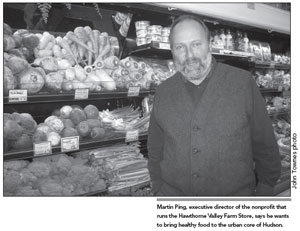News
Grocery shopping downtown?
Hawthorne Valley considers second store — in Hudson
By JOHN TOWNES
Contributing writer
HUDSON, N.Y.
Nearly a decade of calls for re-establishing a downtown supermarket in Hudson could soon be answered, as the nonprofi t group that runs the Hawthorne Valley Farm Store considers setting up a sister store in the city.
The Hawthorne Valley Association, which operates the popular farm store and several related enterprises in the bucolic hamlet of Harlemville, a dozen miles to the east of Hudson, says the new store would aim to make fresh, healthy food available and affordable to as many people as possible – including those of modest means.
“The idea of a diet based on healthy, naturally produced food is often seen as elitist today, but that should not be the case,” said Martin Ping, the association’s executive director. “Everyone should have the right to eat good nutritious food, whatever their income is.”
Although Hudson over the past decade has become a regional mecca for restaurants and also hosts several specialty food stores, it has not had a full-service grocery store within its downtown area in many years.
A former 7,000-square-foot supermarket space on Warren Street now houses an antiques center, and a private, for-profi t supermarket that opened at another downtown location about a decade ago lasted less than two years. More recently, an effort to organize a co-operative food market ran aground in 2012.
For now, the nearest full-scale supermarkets are about 2 miles from the city center in a sprawling suburban area in the town of Greenport.
Partly because of the lack of a grocery store within walking distance, the U.S. Department of Agriculture has classifi ed a large section of Hudson as a “food desert.” The designation refl ects the fact that a relatively large percentage of Hudson residents have limited incomes and do not have cars.
The city also has a substantial number of pedestrian-oriented weekend residents and visitors who travel back and forth between Hudson and New York City by train.
Food with a social mission
The Hawthorne Valley Association began exploring the possibility of opening a food store in downtown Hudson last year. In an interview in January, Ping emphasized that the new store is still in the planning stages, but he said that if everything comes into place, the association would like to open a store this year.
“We’re not naive about the challenges involved, so we’ve been going slowly on this and are being very careful,” he said. “We haven’t made the fi nal decision yet, but unless something unexpected happens, we’re committed to the project.”
The association, founded in 1971, sponsors a variety of programs and projects intended to foster social and cultural renewal through the integration of education, agriculture and the arts.
At its complex in Harlemville, it runs the Hawthorne Valley Waldorf School, a nursery through- 12th-grade day school with boarding and exchange programs, as well as Hawthorne Valley Farm, a 400-acre biodynamic farm with a 65-cow dairy herd, an on-site creamery and 14 acres of mixed vegetables.
Its farm store in Harlemville emphasizes healthy and organic products, carrying fresh items from Hawthorne Valley Farm and other local producers as well as a wide range of packaged food and other items.
Ping said young people in Hudson are already involved in some of the association’s educational programs about food. These programs are held at the farm and also at schools and other sites in the city.
“Adding a store and new learning center in downtown Hudson would be a logical extension of our existing educational activities there,” he explained. “We have been thinking about the idea of opening a store to bring fresh food into Hudson for a number of years.”
The discussions got serious last year when the association was approached by the Galvin Foundation, an organization founded in 2002 by local developer T. Eric Galloway and Henry van Ameringen. Galloway owns numerous properties in Hudson, and the foundation’s stated mission is to redevelop local sites and “improve and enhance the quality of life for all Hudson residents, especially those most vulnerable or economically disadvantaged.”
The foundation is currently building a twostory structure called the Hudson Arcade near the corner of Fifth and Warren streets in the center of the city. Plans for the building originally called for a different, privately owned grocery store as a tenant, but when that venture stalled, the foundation contacted the Hawthorne Valley Association.
“After that, we were also approached by the owner of another site in Hudson,” Ping said. “It seemed like the knock on the door had become louder, and we decided the timing may be right for this idea.”
Ping said the Hudson Arcade building is the most likely site, but other possibilities are also under consideration.
Financial, organizational hurdles
In recent weeks Hawthorne Valley has been surveying the community about the need and level of support for a new store. The association held two public meetings in Hudson in December, and its leaders have been consulting with other local organizations and individuals. One of the December forums was held at Bliss Towers, the public housing high-rise on North Second Street.
“What has been exciting is that we found a high level of interest in the community about the need for this type of food store,” Ping said. “We’ve also been encouraged because many people expressed enthusiasm that our organization might be the one to do it. We’re a familiar presence in Hudson, and we’ve worked with many individuals and community groups. There seems to be a strong desire to work together on this.”
The association has been researching possible legal and operational structures and whether the store might be established as a member-owned co-operative or as a private venture owned by investors.
Ping said the association is investigating combinations of traditional and innovative sources of financing.
“Our goal is for this to be community-based, and we want its ownership and management to be as broad as possible,” he said. “We’re looking at a number of alternatives for a legal structure that will achieve this.”
Ping said it is a complex undertaking, because there are many goals and factors involved.
“We’re taking on a multiple set of challenges with this,” he said. “Operating any type of retail food enterprise is difficult. In addition, we’re a mission-driven organization, so we also have the added challenge of bringing our goals to the store, while also serving other needs of the community and consumers in Hudson.”
He said, for example, that Hawthorne Valley Farm is committed to producing food through methods that recognize the interrelationship of natural systems for fertilization, pest control and livestock handling. An overall goal of the association is to help reorient the mainstream system of food production and marketing toward more natural and healthy choices.
At the same time, he said, the Hudson store should be accessible to everyone, satisfy diverse tastes and preferences and offer items that are affordable.
“We want this to be the community’s store,” he said. “I expect that we’ll try different things out and make changes and adjustments as we go along.”
Farm store, urban setting
Ping said he expects the new store would be comparable in many ways to the existing store in Harlemville, which carries produce, meat, dairy products, baked goods and packaged foods as well as household products and personal items. The merchandise comes from many different suppliers, including local farms and value-added food producers as well as more distant sources.
Ping said the Harlemville store is successful and manages to cover its expenses.
“I think there will be many similarities, including a strong emphasis on customer service,” he said. “However, there will also be differences, because the Hudson store would be in an urban environment with a different role and customer base.”
He also sees Hudson store as a potential venue for exploring longer-range changes and alternatives to the modern system of highly processed and industrialized food production and economics.
“Unfortunately, because of a complex set of economic and policy reasons, it costs more to buy a fresh apple from down the road than to buy one that has been produced on a factory farm on the other side of the world,” he said. “Somehow we have to level the playing field to support regional producers and make affordable good food more widely available again.”
Ping said this goal is actually a return to the traditional role and quality of food.
“The food system we’ve had for the last couple of generations is an anomaly,” he said. “Throughout history, most of our food was produced through natural methods, and it was more nutritious and healthier. ”
The new store, he said, would exist in the context of pursuing this long-range goal.
“I describe it as at least a 20-year process,” he said. “Education can help young people to discover and appreciate fresh wholesome food again. As they become adults, this can create a larger demand that would make it more widely available again. In the meantime, the challenge is to make it more accessible and affordable within the current system.”
Ping said that this could involve several specific strategies to make organic and locally produced foods available to people with limited incomes.
“We’ll look at a variety of ways to offer the best price point for good, clean, healthy food,” he said.
In addition to relying on existing publicassistance programs as food stamps and WIC, he said other possibilities include setting up a fund based on private donations that would provide subsidies to reduce food costs in the store. There are other potential ideas to be explored such as discounts for people who work there.
“This is also intended to be an enterprise that supports a vital local economy, so it will also be a source of jobs,” he said.
Ping said the association is continuing to seek input and ideas from the public. A Web site with basic information and updates on the project, and a feedback form, is online at HawthorneValleyHudson.org.

